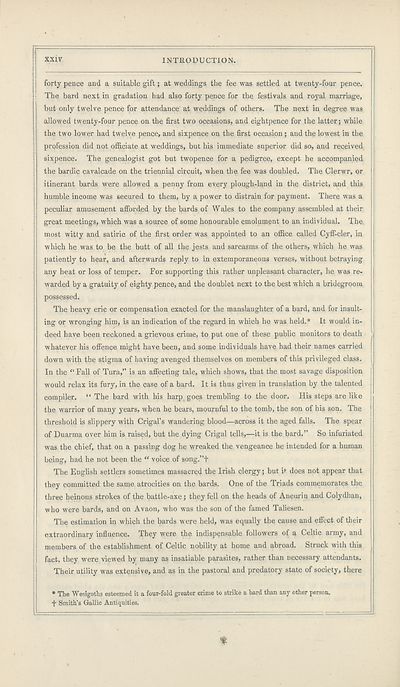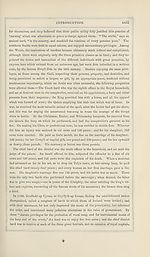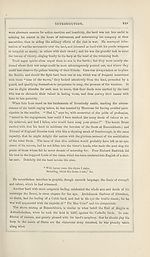Books and other items printed in Gaelic from 1871 to 1900 > Sar-obair nam bard gaelach, or, The beauties of Gaelic poetry, and lives of the Highland bards
(38) Page xxiv
Download files
Complete book:
Individual page:
Thumbnail gallery: Grid view | List view

xxiv INTRODUCTION.
forty pence and a suitable gift; at weddings the fee was settled at twenty-four pence.
The bard next in gradation had also forty pence for the festivals and royal marriage,
but only twelve pence for attendance at weddings of others. The next in degree was
allowed twenty-four pence on the first two occasions, and eightpence for the latter; while
the two lower had twelve pence, and sixpence on the first occasion; and the lowest in the
profession did not officiate at weddings, but his immediate superior did so, and received
sixpence. The genealogist got but twopence for a pedigree, except he accompanied
the bardic cavalcade on the triennial circuit, when the fee was doubled. The Clerwr, or
itinerant bards were allowed a penny from every plough-land in the district, and this
humble income was secured to them, by a power to distrain for payment. There was a
peculiar amusement afforded by the bards of Wales to the company assembled at their
great meetings, which was a source of some honourable emolument to an individual. The
most witty and satiric of the first order was appointed to an office called Cyff-cler, in
which he was to be the butt of all the jests and sarcasms of the others, which he was
patiently to hear, and afterwards reply to in extemporaneous verses, without betraying
any heat or loss of temper. For supporting this rather unpleasant character, he was re¬
warded by a gratuity of eighty pence, and the doublet next to the best which a bridegroom
possessed.
The heavy eric or compensation exacted for the manslaughter of a bard, and for insult¬
ing or wronging him, is an indication of the regard in which he was held.* It would in¬
deed have been reckoned a grievous crime, to put one of these public monitors to death
whatever his offence might have been, and some individuals have had their names carried
down with the stigma of having avenged themselves on members of this privileged class.
In the “ Fall of Tura,” is an affecting tale, which shows, that the most savage disposition
would relax its fury, in the case of a bard. It is thus given in translation by the talented
compiler. “ The bard with his harp goes trembling to the door. His steps are like
the warrior of many years, when he bears, mournful to the tomb, the son of his son. The
threshold is slippery with Crigal’s wandering blood—across it the aged falls. The spear
of Duarma over him is raised, but the dying Crigal tells,—it is the bard.” So infuriated
was the chief, that on a passing dog he wreaked the vengeance he intended for a human
being, had he not been the “ voice of song.”+
The English settlers sometimes massacred the Irish clergy; but b does not appear that
they committed the same atrocities on the bards. One of the Triads commemorates the
three heinous strokes of the battle-axe ; they fell on the heads of Aneurin and Colydhan,
who were bards, and on Avaon, who was the son of the famed Taliesen.
The estimation in which the bards were held, was equally the cause and effect of their
extraordinary influence. They were the indispensable followers of a Celtic army, and
members of the establishment of Celtic nobility at home and abroad. Struck with this
fact, they were viewed by many as insatiable parasites, rather than necessary attendants.
Their utility was extensive, and as in the pastoral and predatory state of society, there
* The Wesigoths esteemed it a four-fold greater crime to strike a bard than any other person.
■(" Smith’s Gallic Antiquities.
forty pence and a suitable gift; at weddings the fee was settled at twenty-four pence.
The bard next in gradation had also forty pence for the festivals and royal marriage,
but only twelve pence for attendance at weddings of others. The next in degree was
allowed twenty-four pence on the first two occasions, and eightpence for the latter; while
the two lower had twelve pence, and sixpence on the first occasion; and the lowest in the
profession did not officiate at weddings, but his immediate superior did so, and received
sixpence. The genealogist got but twopence for a pedigree, except he accompanied
the bardic cavalcade on the triennial circuit, when the fee was doubled. The Clerwr, or
itinerant bards were allowed a penny from every plough-land in the district, and this
humble income was secured to them, by a power to distrain for payment. There was a
peculiar amusement afforded by the bards of Wales to the company assembled at their
great meetings, which was a source of some honourable emolument to an individual. The
most witty and satiric of the first order was appointed to an office called Cyff-cler, in
which he was to be the butt of all the jests and sarcasms of the others, which he was
patiently to hear, and afterwards reply to in extemporaneous verses, without betraying
any heat or loss of temper. For supporting this rather unpleasant character, he was re¬
warded by a gratuity of eighty pence, and the doublet next to the best which a bridegroom
possessed.
The heavy eric or compensation exacted for the manslaughter of a bard, and for insult¬
ing or wronging him, is an indication of the regard in which he was held.* It would in¬
deed have been reckoned a grievous crime, to put one of these public monitors to death
whatever his offence might have been, and some individuals have had their names carried
down with the stigma of having avenged themselves on members of this privileged class.
In the “ Fall of Tura,” is an affecting tale, which shows, that the most savage disposition
would relax its fury, in the case of a bard. It is thus given in translation by the talented
compiler. “ The bard with his harp goes trembling to the door. His steps are like
the warrior of many years, when he bears, mournful to the tomb, the son of his son. The
threshold is slippery with Crigal’s wandering blood—across it the aged falls. The spear
of Duarma over him is raised, but the dying Crigal tells,—it is the bard.” So infuriated
was the chief, that on a passing dog he wreaked the vengeance he intended for a human
being, had he not been the “ voice of song.”+
The English settlers sometimes massacred the Irish clergy; but b does not appear that
they committed the same atrocities on the bards. One of the Triads commemorates the
three heinous strokes of the battle-axe ; they fell on the heads of Aneurin and Colydhan,
who were bards, and on Avaon, who was the son of the famed Taliesen.
The estimation in which the bards were held, was equally the cause and effect of their
extraordinary influence. They were the indispensable followers of a Celtic army, and
members of the establishment of Celtic nobility at home and abroad. Struck with this
fact, they were viewed by many as insatiable parasites, rather than necessary attendants.
Their utility was extensive, and as in the pastoral and predatory state of society, there
* The Wesigoths esteemed it a four-fold greater crime to strike a bard than any other person.
■(" Smith’s Gallic Antiquities.
Set display mode to:
![]() Universal Viewer |
Universal Viewer | ![]() Mirador |
Large image | Transcription
Mirador |
Large image | Transcription
Images and transcriptions on this page, including medium image downloads, may be used under the Creative Commons Attribution 4.0 International Licence unless otherwise stated. ![]()
| Permanent URL | https://digital.nls.uk/107579102 |
|---|
| Description | Out-of-copyright books printed in Gaelic between 1631 and 1900. Also some pamphlets and chapbooks. Includes poetry and songs, religious books such as catechisms and hymns, and different editions of the Bible and the Psalms. Also includes the second book ever published in Gaelic in 1631. |
|---|

